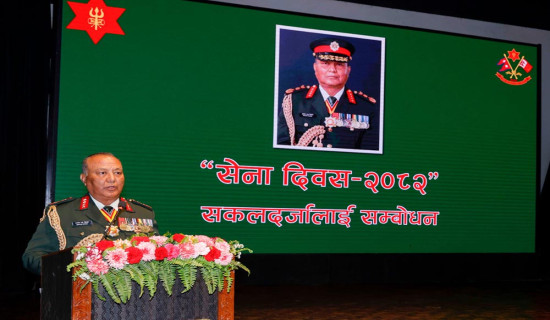- Saturday, 14 February 2026
Decentralising School Education
Mukti Rijal
Recently this writer had an opportunity to visit at least two community schools at the Daskshinkali Municipality at the outer fringe of the Kathmandu district. The school buildings and other infrastructures looked almost adequate and sufficient by our own standards.
The schools had spacious and comfortable classrooms, computer laboratories, toilets and bathrooms, first aid and nursing service provision, midday meal support and so on which speak of the improving situation of wherewithal necessary for better learning outcomes.
However, have these gradually improving and incessantly upgraded school infrastructures, resources and teaching logistics produced corresponding impact to better secure the learning achievements of the students enrolled in these schools? Are the teachers responsible for taking care of the kids and teaching them effectively for their effective emotional and intellectual development doing their job properly and honestly? Do they possess necessary knowledge and aptitude for engaging with students in a compassionate way as a teacher?
Transitional phase
These are some of the important questions that do beg some careful consideration before delving into the question of the school education administration and management. Critically speaking, school, education in Nepal is in the state of flux.
The education sector is passing through a kind of transitional phase characterised by the contradiction between decentralised formal policy arrangement and centralised tendencies of the policy implementers offering resistance to the devolution and downward accountability process.
This is further exacerbated by the lack of awareness on the part of the local government officials on the seriousness and gravity of their constitutional obligations on school education.
Moreover, local governments are thus yet to take full cognizance of the need for an effective utilisation of the resources available at their disposal. Needless to repeat, the federal constitution of Nepal entrusts local government the roles and functions expressly related with, among others, school education management and implementation. But the central government appears fully reluctant to transfer to local government the cutting edge authority related with school education management and administration. The central government apparatuses at Singha Durbar and Sanothimi are fully inclined to keep essential authority at their disposal without being challenged and assailed from any quarters.
According to legal provision stipulated in line with the federal arrangement, the central government has been required to disband the existing agencies like district education offices and transfer human resources and assets to the local governments. But after almost eight years following the implementation of federal constitution, the important education related authority has been more or less retained with the apparatus of the central government.
Former district education offices (DEOs) have been reincarnated as district education coordination and development units and they do more or less as the clearing agents of the ministry of education of the central government.
Arguing that local governments suffer from capacity deficits to look after and govern school education effectively, the central government wields an excuse to exercise the key allocation roles and authority.
The local governments’ capacity deficit has given the pretext for the central machinery to concentrate key authority only to permit the peripheral and insignificant responsibilities to be exercised by them. But it looked a bit different at the time of COVID-19. When the pandemic hit the country, the federal government seemed to be quick to abdicate one's own responsibility.
It was reflexive and quick enough to transfer the some of the delicate tasks to the local governments like setting up quarantine centers, isolation facilities and so on.
In fact, the rationale behind entrusting roles and mandates relating to secondary education to local government is that the schools operated through decentralised arrangement perform better and deliver education services efficiently and effectively. An effective monitoring and supervision of the teachers through community engagement and participation is possible at the local level. Local government can address the education related service delivery issues more effectively. Similarly, accountability of teachers can be better ensured to improve the learning conditions and outcomes. But the federal government has manipulated the situation to one's own favour on the ground that the local governments needed capacity development to take full charge of the situation.
It needs to be mentioned that the school education up to lower secondary level is provided almost free, and the students passing out from the public schools are also given preference in their pursuit of higher education. By all standards, the salary structure and perks given to the teachers for the public schools is higher when compared against the remunerative provision at the private schools. The school teachers at the public schools are treated more or less at par with the civil servants. When there has been a raise in the salary of the civil servants, a corresponding increase of the perks of the teachers is also announced simultaneously.
Accountability
Despite this, that teachers' accountability to their job does not seem to have enhanced. Even when there is an increase in the educational infrastructures, teachers are found lacking motivation to fulfill their responsibilities. Efforts should be made to hold teachers accountable for securing effective learning outcomes.
The constitutional intent to devolve the school education-related function upon the local government constitutes undoubtedly a big leap forward for decentralized delivery of the education services and accountability of teachers. But for this to occur, local governments also need to be made truly capable and responsible to govern the school education. Only then they can be equally capable to respond to imperatives of popular legitimacy as the important norm of democratic governance at the local level.
(The author is presently associated with Policy Research Institute (PRI) as a senior research fellow. rijalmukti@gmail.com)
















